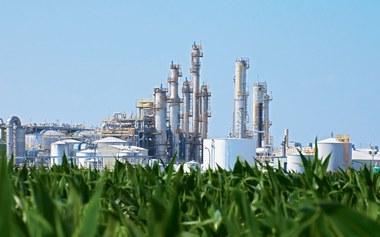SusBioChem: biomass-derived chemicals for agrochemicals or plastics
(19-09-2018) Ghent University and Sichuan University (China) have submitted a proposal to investigate the potential of oxygen-rich biomass-derived chemicals in order to recalibrate chemistry towards biorefinery.
In a bilateral cooperation between Ghent University and Sichuan University (China), researchers will investigate the potential of oxygen-rich chemicals as biomass-derived raw materials to produce a wide range of organic building blocks which can be used in the production of pharmaceuticals, agrochemicals and more sustainable plastics with a higher level of bio-compatibility or biodegradability. The project would be funded as a bilateral science cooperation by the FWO, a Belgian institution which supports fundamental and strategic scientific research, stimulates international cooperation and promotes equal opportunity.
Aim of the research
The main goals of this research proposal are the
(1) Innovative process development for sourcing oxygenated products from lignocellulose
(2) Chemical modification of renewable biomass-derived resources
(3) Synthesis of sustainable and functional polymer materials
Lignocellulose is the most abundant inedible biomass source available to humans. It is mainly comprised of a mixture of cellulose and hemicellulose carbohydrate polymers. Deconstruction of cellulose and hemicellulose and subsequent catalytic transformation leads to useful building blocks and thus offers great potential for biorefinery applications. A variety of useful organic chemicals have been produced from lignocellulose.
Oxygen-rich chemicals hold promise for their direct utilization as biomass-derived raw materials, for the production of a wide range of organic building blocks. One of the most notable applications is the production of polymers with more bio-compatible or biodegradable properties that can be produced from renewable and more carbon-neutral resources. A recently emerging new paradigm in polymer chemistry is the design of materials that owe their properties to strong, but chemically reversible bonds. Oxygen bonds are receiving a lot of attention in this regard, as these can combine chemical strength with chemical reactivity. Materials based on covalent exchangeable bonds, such as can be processed, repaired and recycled, while preserving the material properties provided by the adaptable bonding network.
Global relevance
Depleting fossil resources, petrorefinery-induced pollution and a growing demand for energy & chemical products drive the transition towards a more sustainable bio-economy. A potential solution is the use of more renewable chemicals from biomass. So far been little explored, it remains to be seen which raw materials can be obtained in a cost effective manner from cheap biomass.
Hydrocarbon-derived polymers owe part of their success to their chemical inertness. In addition to their light weight, low cost and easy (‘plastic’) processing, these materials are chemically very robust and their physical degradation products can survive for hundreds of years. This feature is more and more becoming a nuisance and is hazardous for the environment. Biodegradable polymers are one way to alleviate some of these issues, but such materials are not suitable for all applications and may cause new hazards. Collection, sorting and physical recycling of polymer waste usually leads to a downgraded product, with properties that do not match those of ‘virgin’ materials. Chemical degradation or caloric recycling (burning) are often not straightforward or cost-effective processes. An increased industrial focus on biorefinery processes is expected to make available an entire new subset of readily available raw materials that can enable the design of new pharmaceuticals and agrochemicals
The envisaged approach is innovative because cutting edge biorefinery and cutting edge synthetic & polymer chemistry are brought into a constructive dialogue from the start. This will improve the development of cost-effective solutions that can be implemented across biobased value chains to maximize the impact of this fundamental research. This is a worthy and timely topic for young chemists to be trained in, since recalibrating synthetic & polymer chemistry towards the particularities of biorefinery is going to become the reality in chemistry.
